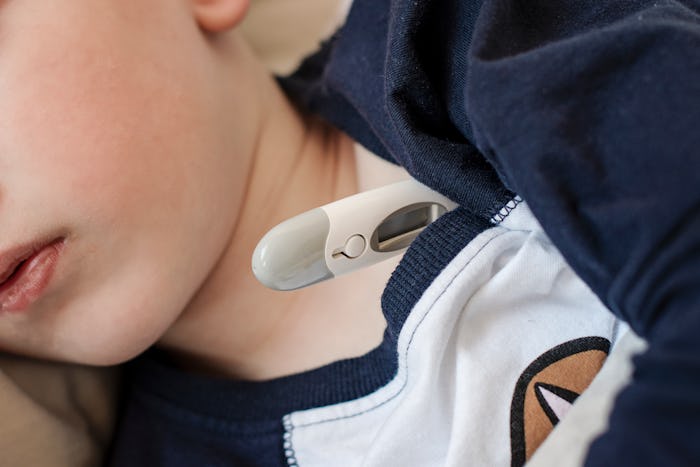News

New Study Shows COVID-19 May Be Less Severe For Kids, But Researchers Aren't Sure Why
While this flu season hit children particularly hard, the recent coronavirus pandemic appears to be having a more mild impact. As a recently-released study found, the new coronavirus, COVID-19, may be less severe for children than it is for adults.
As the number of confirmed coronavirus cases continues to grow around the world, researchers in China spent three weeks studying the virus' effect on children for a study published Monday in Pediatrics. Researchers found that while children of all ages appeared to be susceptible to coronavirus, the majority of children experienced only mild illness.
Of the 2,143 children for whom researchers analyzed data, 51% had mild illness, 4% were completely asymptomatic, and 39% experienced moderate illness. Roughly 6% of children involved in the study had severe or critical levels of illness. In comparison, researchers noted that 18.5% of adults have experienced severe or critical illness.
"Of the 2,143 pediatric patients included in this study, only one child died and most cases were mild, with much fewer severe and critical cases than adult patients," a peer-reviewed pre-publication of the report read. "It suggests that, compared with adult patients, clinical manifestations of children’s COVID-19 may be less severe."
However, while children as a whole appeared less likely than adults to experience severe illness, researchers did find that infants had higher rates of serious illness when compared to older children. Just under 11% of infants experienced severe or critical illness compared to 7% of children age 1 to 5, 4% of children age 6 to 10, 4% of children age 11 to 15, and 3% of children age 16 and older.
It's worth noting, however, that not every child involved in the study was confirmed to have coronavirus. In fact, roughly two-thirds of children participants were "suspected" but not confirmed to have coronavirus while the remaining one-third of participants were confirmed to have the virus through laboratory testing.
That being said, this isn't the first study to find that children were less likely to experience severe coronavirus symptoms and illness. For example, a study published in Nature Medicine earlier in March found that of 745 children known to have had close contact with a coronavirus patient or be members of families that experienced outbreaks, only 1.3% were found to be infected by the virus. What's more, the study found that none of those 10 infected children showed signs of pneumonia, as many adults with severe cases of coronavirus did.
The Centers for Disease Control and Prevention has also noted that, "based on available evidence, children do not appear to be at higher risk for COVID-19 than adults." In fact, the federal agency has stated that, "while some children and infants have been sick with COVID-19, adults make up most of the known cases to date." They've also stressed that symptoms for coronavirus do not differ from children to adults.
Researchers behind this latest study noted that the differences in severity between pediatric and adult cases of coronavirus was "puzzling," but said it could be related to exposure and host factors. Among researchers' suggested, but not confirmed, reasons for the difference was the possibility that children have fewer opportunities for exposure, higher levels of antibodies available to fight against viruses, or that the virus may not bind as well to children's cells. Researchers have stressed that more research would be needed to determine why coronavirus appeared to impact children and adults differently.
If you think you’re showing symptoms of coronavirus, which include fever, shortness of breath, and cough, call your doctor before going to get tested. If you’re anxious about the virus’s spread in your community, visit the CDC for up-to-date information and resources, or seek out mental health support. You can find all of Romper’s parents + coronavirus coverage here, and Bustle’s constantly updated, general “what to know about coronavirus” here.
Studies referenced:
Dong, Y., Mo, X., Hu, Y., Qi, X., Jiang, F., Jiang, Z., & Tong, S. (2020). Epidemiology of COVID-19 Among Children in China. Pediatrics. doi: 10.1542/peds.2020-0702
Xu, Y., Li, X., Zhu, B. et al. Characteristics of pediatric SARS-CoV-2 infection and potential evidence for persistent fecal viral shedding. Nat Med (2020). https://doi.org/10.1038/s41591-020-0817-4